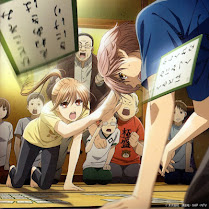I
determined that sports is the Japanese answer to
psychology-on-the-couch. Sports satisfies both the communal and
ego-centric aspects of human nature.
There is a reason Progressive leftists in the West are
willing to let grown biological men compete as women in sports that rely on muscle, physical speed, and physical endurance. They don't care because for these particular activists, competition is a symbolic act, representative of something entirely divorced from the sport. It's what the players say in the media or what they "mean" to various groups in terms of their labels.
 For these activists, the sport can be gutted,
shorn of its actual competitive purpose, because they don't care about
the actual sport, not enough to understand the fierce desire by players to play and win.
For these activists, the sport can be gutted,
shorn of its actual competitive purpose, because they don't care about
the actual sport, not enough to understand the fierce desire by players to play and win.Activists of this ilk will eventually lose, of course. People love their sports too
much. Thankfully! In terms of meaning, the survival of sports is an act of libertarian
conservatism:
Sports are the ultimate combination of reality, rules, and
individualism.
 1. All the abstracted, jargon-heavy theories in the world don't replace actual ability and discipline.
1. All the abstracted, jargon-heavy theories in the world don't replace actual ability and discipline.
In Yuri on Ice! the 15-year-old male competitor is well-aware that his body will change as it ages. He is also aware that although he has the edge on the protagonist in terms of youth/energy and inherent talent, he lacks the protagonist's stamina.
 1. All the abstracted, jargon-heavy theories in the world don't replace actual ability and discipline.
1. All the abstracted, jargon-heavy theories in the world don't replace actual ability and discipline.In Yuri on Ice! the 15-year-old male competitor is well-aware that his body will change as it ages. He is also aware that although he has the edge on the protagonist in terms of youth/energy and inherent talent, he lacks the protagonist's stamina.
At 23, the protagonist Yuri K. is at
the upper range of being able to compete (only a few more years if he is lucky), but he has physical power and
discipline (along the same lines, the real life figure skater Yuzuru Hanyu, now professional, has the ability to build up great speed--which is necessary for jumps--from a still position).
Likewise, Chihaya's ability to hear syllables as soon as the
readers take a breath is an actual skill and, interestingly enough,
sometimes a hindrance, depending on the player she is up against. All the team members continually practice to build up speed and recognition--and they rely on research regarding their competitors' strengths and weaknesses.
The game's
environment is also a reality that players must take into account. Nobody complains, except in their heads, when the air conditioning cuts out. The stuffy room with non-moving air is reality. Make it work.
All the sophisticated finger-pointing theories in the world
don't wipe out the rules, not in the moment of the game. Sure, they may
be structural manifestations of some corrupt system or of war or whatever, but, eh, in the
world of sports, blaming the "system" is simply making excuses. Characters
need to meet the standards set by the game.
Both anime series deliver the rules in bits and pieces--namely, viewers learn them when the rules become important to the plot. Consequently, with Yuri,
I've learned a tremendous amount about how figure skating is judged. I
always assumed that falling was end-of-game but it turns out, the rules
are more complex, and the strategic skater will take them into
consideration.
Likewise, I am continually amused and amazed with Chihayafuru
that psychological attacks, such as standing up and stretching, calling out, or
slapping the mat, are not considered cheating but rather permissible
actions that the other team had better learn how to handle. And I was
impressed that the one first-year, Akihiro, wasn't given a pass for
being able to play 2nd verse karuta. That's nice--okay, now learn the
rules that apply here and now.
The games and performances become the manifestation of deliberate inner conclusions by separate individuals.
The blow-by-blow tournament episodes in Chihayafuru are accompanied by blow-by-blow inner thoughts and reactions from the characters
In Yuri on Ice!, Yuri K. struggles with confidence--his performances
become the literal manifestation not of bolstered self-esteem but of
fierce personal analysis and choices and will.
Okay, in both anime, the self-esteem element is part of the characters' success. But that element is a recognition of what they do--what inner strengths and abilities they should rely on at a particular moment and why.
It's that focus on why and its connection to how that blows me away. Freud has nothing
on these folks! Therapy may be stigmatized in Japan. I would say it has
been going on for years, what with sports and preparing for final
exams. Therapy is almost redundant.




No comments:
Post a Comment